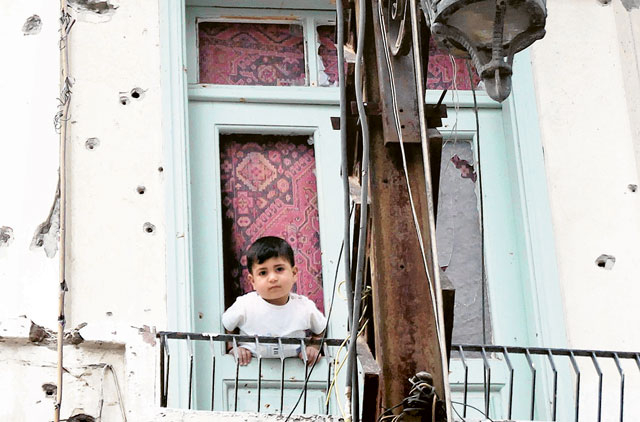Shell-shocked Baba Amr a ghost town
Two months of bombardment has reduced this district of Homs to nothing more than a heap of ruins

Homs: A terrorist haven in the eyes of the Syrian regime but "heart of the revolution" for its foes, Baba Amr is now a ghost town where residents move silently among the rubble of their homes.
Two months of bombardment reduced this central district of Homs city to nothing more than a heap of ruins. The walls of houses are pocked with bullets holes, punctured by tank shells and gouged by shrapnel.
In a deserted street, a mother with two children carries a green suitcase.
"We have gathered all our things. The house is no longer inhabitable. My husband and I are engineers, but there is no more work in town and so no money to fix it. I think we will emigrate," sighs 55-year-old Umm Adnan.
Not one house has been spared, as if they had been built of clay and not concrete.
"May God forgive them for the evil they did to us," Umm Abdo, 35, says, her voice choking with frustration as she and her husband gather their possessions from what was once the family home.
The building's second floor collapsed, crushing their flat. "The tanks fired on the buildings and we escaped by making a hole in the wall of our garden to take refuge with the neighbours. We again had to leave, as the fighting came dangerously close. We had to shelter for six days with people we didn't even know!" she says angrily.
"Nothing remains of the house where I lived with my husband and three children," she says.
Asked about the presence of armed men, who according to the rebels "protected" this area of two square kilometres. but who the regime says held its residents "hostage", she dodges the question. "We were people who lived in peace," she responds.
Caught in the crossfire
Her home was located on the front line facing Inshaat, a district controlled by government forces. Only Karami Street, a few metres wide, separated the rival sides.
The rebels used alleys between the houses. "They created a long corridor that allowed them to draw out our forces and then slip away," says Ahmad, a 37-year-old army captain, pointing to holes in buildings. "They [the rebels] have destroyed everything because they didn't care about the people," a soldier says.
At each junction, security forces have set up checkpoints flying the Syrian flag and plastered with posters of President Bashar Al Assad.
"We had 200 soldiers killed and 1,000 wounded in this battle. We found 100 tonnes of explosives. We had to tread cautiously because they had rigged everything with bombs. It took us 28 days," says an officer in the security forces.
"This was the sorting centre for weapons arriving from Lebanon. In retaking this quarter, we've reduced the smuggling of weapons but we know it's impossible to stop it completely," he adds.
Beyond the rubble of Baba Amr, the land is covered with spring red poppies. But here too the war has left its mark, with fields pockmarked with mortar holes.
Sign up for the Daily Briefing
Get the latest news and updates straight to your inbox


